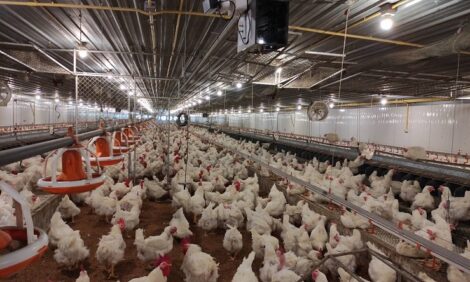



Extended Downtime, Raised Biosecurity Beat ILT
US - Extended downtime between flocks, raised biosecurity and close cooperation between neighbouring poultry companies all played an important role in eliminating infectious laryngotracheitis (ILT) following an outbreak in California, say researchers.In a paper in the current issue of Avian Diseases, R.P. Chin of California Animal Health & Food Safety Lab System–Fresno and co-authors from the University of Georgia and Foster Farms report that control of an outbreak of ILT was achieved by leaving the poultry house empty for a period of one to three months, and raising the level of biosecurity.
They explain that an outbreak of vaccinal ILT began in 2005 involving 57 ranches of two broiler companies in California. Standard biosecurity, and cleaning and disinfection programmes along with vaccination, did not stop the outbreak. Due to the close proximity and number of birds in the same geographic area, the decision was made by both companies to attempt a joint regional and zonal depopulation strategy.
The strategy involved extended downtime between flock placements on ranches located within close proximity to one another. This extended downtime on each ranch ranged from 30 to 91 days.
An extensive biosecurity audit, with more than 70 items, was implemented. Briefly, this included heating all houses to 37°C for 100 hours, removing the litter, cleaning and disinfecting everything on the ranches, then again heating the houses to 37°C for 100 hours. Used litter was spread on crops away from poultry, or was sent to a litter processor for pasteurisation.
Extensive surveillance for LT at 28, 35 and 42 days of age was performed on the initial flocks, which had been placed immediately after the extended downtime.
Since completion of this plan in early 2008, ILT was diagnosed on only two of the previously 57 affected ranches. Those two ranches, and those within close proximity, went through the extended downtime programme and biosecurity audit a second time. Currently, both companies are free of ILT.
The researchers say that this programme lends credence to the importance of cooperation between companies to consider all the ranches within close proximity as the population at risk. In the control of ILT in broilers, the programme also highlights the necessity for extended downtime and enhanced biosecurity auditing of all flocks.
Reference
Chin, R.P., M. García, C. Corsiglia, S. Riblet, R. Crespo, H.L. Shivaprasad, A. Rodríguez-Avila, P.R. Woolcock and M. França. 2009. Intervention strategies for laryngotracheitis: impact of extended downtime and enhanced biosecurity auditing. Avian Diseases 53 (4): 574–577. doi: 10.1637/8873-041309-Reg.1
Further Reading
| - | You can view the full report (fee payable) by clicking here. |
Further Reading
| - | Find out more information on infectious laryngotracheitis (ILT) by clicking here. |








